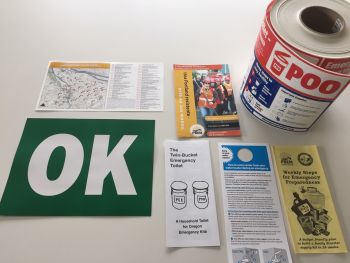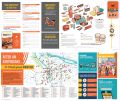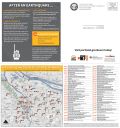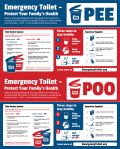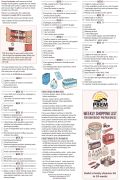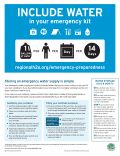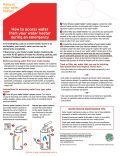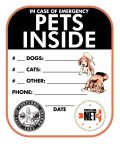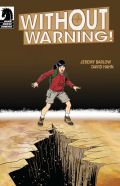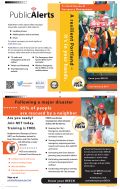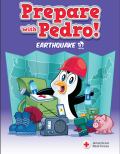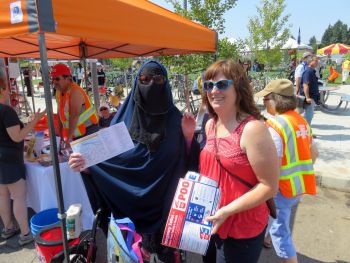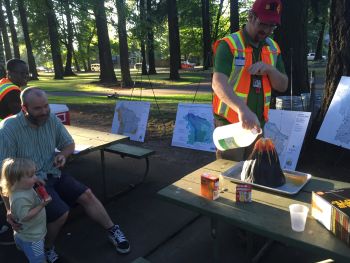Printed Community Handout Materials
This page is intended to serve both the general public and to aid PBEM staff when considering handout updates and ordering materials.
| If you wish to request any materials distributed by PBEM, please do so at least two weeks before you need them. You can request materials by completing the online REQUEST FORM. |
NETwiki distinguishes between printed "Handout Materials" and "Community Education Curricula", and they are posted to different pages:
- Handout Materials are short-form informational resources designed to be used by an individual, typically distributed at community events, and do not necessitate a facilitator or community leader leading neighbors through a learning process.
- Community Education Curricula are long-form informational resources designed for individuals and/or organized neighbors to work through towards a shared resilience goal, and often suggest a neighbor as a "lead facilitator" coordinating the process.
Below is a table and gallery of in-print PBEM published handouts. PLEASE NOTE that "in-print" does not mean "in stock"; nor does it mean we currently have the resources to print new copies of out of stock handouts. All PBEM published materials are intended for public use and may be reprinted for free public use; commercial use is prohibited. Materials may not be altered for any reason.
Where possible, PBEM and partner organizations have materials translated into multiple languages.[1]
| In-Print Handouts | ||||||||||||||||
|---|---|---|---|---|---|---|---|---|---|---|---|---|---|---|---|---|
| Handout | Last Update | |||||||||||||||
| PocketPrep | 2022.03.29 | en | es | |||||||||||||
| BEECN Postcards | 2022.05.26 | en | es | ru | vi | zh | ||||||||||
| BEECN Refrigerator Magnets | 2017.02.13 | en | ||||||||||||||
| Pee+Poo Bucket Stickers | 2022.02.14 | en | es | ko | ru | so | uk | vi | zh | |||||||
| 24-Week Family Preparedness Shopping List | 2022.06.29 | en | es | |||||||||||||
| Water Storage/Treatment Postcards | 2022.05.25 | en | es | ar | hi | ja | kar | km | lo | ko | ne | ru | so | vi | zh | |
| Water Heater Hang Tags | 2022.05.25 | en | es | ar | hi | ja | kar | km | lo | ko | ne | ru | so | vi | zh | |
| Recruitment QR Code Sign | 2024.06.12 | en | ||||||||||||||
| Pet Safety Window Cling | 2022.07.20 | en | ||||||||||||||
| Without Warning! Comic Book | 2014.07.08 | en | es | |||||||||||||
| NET Brochure | 2016.11.26 | en | es | ru | vi | |||||||||||
| Prepare with Pedro | 2020.09.22 | en | es | ko | vi | zh | ||||||||||
- PBEM in-print handouts; click image to enlarge.
PocketPrep
PocketPrep is the flagship of our mighty fleet of informational handouts. The PocketPrep was designed and printed with the following considerations in mind:
- Reduce the number of handouts PBEM prints to a single piece. We were only moderately successful on that, but it did reduce four handouts down to one.
- Create something that recipients want to hang onto instead of recycling. This was done with eye catching design and providing space for for people to write in information. The design worked well enough that Z-CARD North America uses PocketPrep as a product sample for getting emergency prep communications into peoples' hands.
- Make it durable. PocketPreps are printed on waterproof, tear-resistant paper.
- Make it portable. Unfolded, it measures about 23" x 9". But it folds down to the size of a credit card.
There are a few production drawbacks, however:
- They're expensive...about $2.27 apiece. That means we need to encourage NETs and neighbors to have conversations with people about them instead of simply handing them out or dropping them on a table for people to take.
- The file design formats are challenging to edit; only a professional graphic designer would be able to do it. That can make updates and getting these translated into other languages difficult.
- That they are printed on durable paper means that folks can only write on them using ballpoint pen or a pencil (gel ink slides right off).
- So far, we've only found one vendor who can print them cost effectively (Z-CARD).
Specifications
Printed, foldable information brochures with outer cards. Outer Cards: 3 ⅜” X 2 ⅛” – 18 pt C1S Board with Gloss coating. Inner Sheets: 23 ¼ ” X 9 ¼” – .0042” Polyart Synthetic text paper. Colors: Outers: 4/0, Inners: 4/4. Illustrations were completed by Hugh Newell. Krista Gust with the Portland Bureau of Planning and Sustainability completed layout and graphic design.
Appropriate use
Because of their cost and our interest keeping material out of the waste stream, PocketPrep was designed not to be a typical government hand-out-and-toss piece of swag. Having a conversation about PocketPrep with someone is just as important as getting it into someone's hands. Therefore, requests for quantities of PocketPrep will also include one-sheets that explain to volunteers how they should distribute PocketPreps. .You can download a PDF of the instructions HERE..
We estimate it takes 45 seconds to one minute to explain PocketPrep to people. So if someone orders 120 pieces for a tabling event that last one hour, PBEM is only going to give 50 or so.
PocketPreps incorporate information on purifying water, BEECN locations, the two bucket system, pet prep, Drop/Cover/Hold, how to shelter in place, Public Alerts, and how to join Portland NET.
The "PocketPrep Instructions" read like this:
| PocketPrep Instructions
Thank you for helping us promote community resilience through outreach! This sheet is intended to offer some guidance on talking with folks about the PocketPrep handout, and disaster preparedness.
|
Project history
PBEM debuted the PocketPreps on August 18, 2019. After a few months of design work and stakeholder vetting/feedback, PBEM ordered the first print run (partially funded by the UASI 16 grant) in May 2019, for August delivery. The initial run proved popular and prompted a second run in March 2020, but the COVID-19 pandemic effectively shut down opportunities to distribute PocketPrep from March 2020 to 2022. PBEM wouldn't order another run until August 2023 (also funded by a UASI grant). It was this third print run that debuted PocketPrep in Spanish. In early 2023, the text of the PocketPrep was translated into Vietnamese and Simplified Chinese as well. However, PBEM has so far been unable to fund a print run of PocketPreps in those languages.
Even though PBEM has not received formal awards for PocketPrep's design, Z-CARD America (the printer) uses them as part of their marketing campaigns as an example of how their product can help raise awareness of disaster preparedness.
BEECN Postcards
The PocketPrep has a BEECN map on one side. But these postcards continue to be popular, so PBEM continues to print them in multiple languages.
Specifications
Printed double sided and full color CYMK on Accent Opaque 80# cover card stock. Finishing size is 11 ½" x 6 ⅛". Approximately $.50 per piece at last print run in May 2022; reference P&D order #1240552. Krista Gust with the Portland Bureau of Planning and Sustainability completed layout and graphic design.
Appropriate use
PBEM is OK with simply handing these out casually. But when possible, outreach volunteers use the postcard to engage with someone about where their closest BEECN in, and then mark the location for the person to take home and stick it on the refrigerator. This works even better when a large map of the neighborhood is available at the table.
Project history
The first run of BEECN postcards were mailed to every household in Portland in early December of 2012 and mentioned in a December 11, 2012 PBEM press release announcing the debut of the BEECN program. The total mailing cost arrived at approximately $60,000 (printing costs were $13,860.95 according to P&D order #1123433; postage costs unclear). However, as the postcards landed in residential mail the same time as seasonal junk mail and holiday catalogs, the postcard was widely (though anecdotally) reported to have met the same fate of those mailers: tossed in a recycling bin with barely a passing glance. It did not make the impression hoped for.
BEECN Magnets
Specifications
3" x 4" finishing size. Created in Adobe InDesign by Krista Gust.
Appropriate Use
The magnets are best paired with the BEECN postcard or the PocketPrep (i.e. a map of the BEECN system). The idea is that a recipient will use the map to find their nearest BEECN, write the location down on the magnet with a felt marker, and stick it up on the fridge.
Project History
Originally conceived by Felicia Heaton (PBEM PIO) in 2016. A second version (which is the current version) was designed by Krista Gust (graphic designed with Portland Planning and Sustainability).
Pee+Poo Bucket Stickers
| The following text is quoted or paraphrased from the Emergency Toilet Project website. The Emergency Toilet Project is a project of the Regional Disaster Preparedness Organization (RDPO): |
Several recent disasters in the United States have caused damage to portions of water and wastewater systems, leaving major metropolitan areas without access to clean water and flushable toilets for prolonged periods. Emergency managers, among others, have recognized a need to improve post-disaster sanitation management and educate communities on how best to manage human waste.
The stickers are not to be used for commercial purposes. Anyone may use the materials for non-commercial purposes, as long as they site the source: "Regional Disaster Preparedness Organization of the Portland Metropolitan Region, with funding from the U.S. Department of Homeland Security/Urban Areas Security Initiative (UASI) grant program."
Specifications
PBEM does not publish this handout, but we place orders for them with our regional partners. The printing and finishing specifications for the stickers are 3.1 white semi gloss w/permanent adhesive + .8 clear overlaminate w/permanent adhesive. 3 printed colors: red, blue & black; 8" x 13" perf/sheet; finishing size of each sticker is 13 ¼" x 8 ¼". Readability of the stickers was evaluated using the Flesch scale; the stickers came in at a score of 5.5, suited for school grade 5 or higher reading level. Graphic was composed in Adobe Illustrator. They cost about $1.51 apiece to print.[2]
Appropriate use
The stickers were designed to be printed as stickers and placed on poo and pee buckets (the buckets should be two separate buckets). You can also print them on card stock or regular paper and use packing tape to affix them.
Project history
In 2016, Sue Mohnkern of Washington County Public Health led the RDPO’s Regional Disaster Sanitation Task Force to develop guidelines for disaster sanitation following a Cascadia Subduction Zone Earthquake. In 2017, the technical content created by that task force was passed to the RDPO’s Regional Disaster Preparedness Messaging Task Force under the initial leadership of Felicia Heaton, formerly of Portland Bureau of Emergency Management, and then Cynthia Valdivia, a bilingual outreach and multicultural public educator with Washington County Public Health.
With the help of an Urban Areas Security Initiative (UASI) grant, the RDPO hired Portland-based consulting firm Barney and Worth to help transform the disaster sanitation guidelines into pre- and post- event educational tools.
24-Week Family Preparedness Shopping List
This is probably the most popular PBEM-published handout. It gives recipients an opportunity to incrementally engage with disaster preparedness, and build a sufficient kit in 24 weeks.
Specifications
Tri-fold printed double-sided and full color CYMK. Finishing size is 11" x 8 ½". Illustrations by Hugh Newell; graphic design and layout by Hexad Studios.[3]
Appropriate use
The handout itself is self-explanatory enough that leaving them as a "take one" item at a table or counter is appropriate. However, best practice is for an experienced NET to talk through some of the list with people. They may have questions about where and how to store things, ask for advice about shelf stable food, and so on.
Project history
For as long as Jeremy can remember anyway, PBEM has always stocked a 24 Week Shopping List and it is unclear who put the first one together. The older version was last revised in May of 2018. That version was revised, reformatted, and re-illustrated in 2022 in conjunction with an effort to get it translated into Spanish.
Water Storage/Treatment Postcards
| You can find more information about Regional Water Providers Consortium publications at their website. |
Postcards the instruct on storing tap water in personal containers. These postcards are not published by PBEM, but provided to us for distribution by the Regional Water Providers Consortium. The Consortium does not take requests from the public, and their materials must be requested through PBEM.
Specifications
Double sided, finishing size is 8 ½" x 5 ½". Designed in InDesign. They cost approximately $.50 apiece to print.
Appropriate use
This does work as a "take one", but recipients should be encouraged to include the postcard inside their preparedness kit. Even when not in the midst of an emergency, folks are challenged to remember how much bleach goes into what amount of water.
Project history
PBEM has received these postcards from the Regional Water Providers Consortium since at least 2018.
Water Heater Hang Tags
| You can find more information about Regional Water Providers Consortium publications at their website. |
Following a catastrophic disaster, the water stored in a hot water heater could serve as a viable source of emergency water. The Water Providers Consortium has created a tag to affix to water heaters that instruct folks on how to access that water. The Consortium does not take requests from the public, and their materials must be requested through PBEM. They also created an instructional video, embedded to the right.
Specifications
The Regional Water Providers Consortium prints these and provides them to PBEM for distribution. Finishing size is 4.38" x 11.12", double sided. They cost approximately $.50 apiece to print.
Appropriate use
These tags have a diagonal cut on towards the top that leads inward towards a punch-out area at the top. The idea is that these be hooked onto the top of a water heater so that the recipient has access to helpful instructions when they get to their water heater immediately following a disaster.
Project history
PBEM has received these tags from the Regional Water Providers Consortium since at least 2018, and possibly before that year.
Pet Safety Window Cling
This is the PBEM version of a window cling that is popular in other places in the country and available through the ASPCA. However, we are considering discontinuing them after the current stock runs out. They are expensive, and we learned later from firefighters that rescue workers seldom pay them any heed because people do not keep them updated (although, we knew that going in, which is why we added a date line). At least so far, they haven't proved to be particularly popular as a handout, but maybe we haven't found the right way to promote them yet.
Specifications
Material: clear RI-Cling printed face down for viewing through glass. Finishing size is 5" x 6". Full color CMYK. Designed in InDesign by Jeremy Van Keuren, artwork completed by Hugh Newell. Last print run in July 2022 had them at approximately $3.05 a piece.
Appropriate use
This is a slightly adhesive window cling that relies mostly on static electricity to stay on a window. Optimal placement is on a window near or on a front door so that rescuers have it in plain view. The recipient should write on the side of the cling that faces out and through the window. The recipient should put the day's date when they fill it out to clue rescuers in to how old the information may be.
Project history
Jo Becker (an animals in disasters speaker and educator) suggested in March 2022 PBEM come up with a pet safety window cling similar to the one put out by the ASPCA. Jeremy worked with Hugh Newell to design one and make an initial print run, which Portland P&D outsourced to Pro Ad Co.
Without Warning! Comic Book
| Oregon Emergency Management hosts more publications at their website. |
"Without Warning" is a comic book for young audiences about a bucolic Pacific Northwest community upended by a major earthquake. PBEM does not print/publish this handout; it is provided by the State of Oregon Office of Emergency Management for PBEM to distribute. Oregon OEM does not take materials requests from the general public.
Specifications
16 page comic book, 8 ½" x 11", saddle stitched. PBEM receives printed copies only through the State of Oregon OEM.
Appropriate use
This is a preferred awareness and preparedness publication written and designed with teenagers in mind. Without Warning! is ideal for events that involve youth and/or TeenCERT.
Project history
Althea Rizzo at Oregon OEM collaborated with Oregon's Dark Horse Comics to create Without Warning! and release it in 2014.[4] Since the release of the comic book, Dark Horse Comics has continued to publish youth preparedness comics under the "Without Warning!" project, such as for tsunamis and wildfires, and Dark Horse has made the series available free to read on their project website. However, PBEM stocks hard copies only of the Earthquake comic at this time.
NET Brochure
The NET Brochure was conceived as a basic "take one"-style brochure connecting recipients to completing a NET application and also informing them of PublicAlerts.org. PBEM will not do more printings of the NET Brochure because its purpose is met with the PocketPrep. However, we still have many copies of this handout in stock (particularly in languages other than English), so they can be requested until the stock runs down.
Specifications
Half-fold printed double-sided and full color CYMK. Full bleed. Finished size is 11" x 8 ½". Printed on AEPP Mohawk Text-11. Photographs by Ethan Jewett; graphic design and layout composed in InDesign by Jeremy Van Keuren.
Appropriate use
NET Brochures are appropriate as "take one" materials; they require little to no explanation. Best used for audiences who know what Portland NET is and want to learn more. PBEM recommends talking briefly about the Public Alerts.org portion.
Project history
PBEM has used a handout like this one since at least 2010, with the current design released in Spring of 2014. The photos came from a photoshoot with Ethan Jewett photographing NET volunteers and PF&R personnel at PFF&R Station #2. PBEM discontinued new print runs after debuting the PocketPrep.
Prepare with Pedro!
| Visit Ready.gov's website for more Prepare with Pedro materials. |
Prepare with Pedro is a series of K - 2 preparedness storybooks put out by both FEMA and Red Cross. PBEM keeps the earthquake preparedness storybook in stock, but FEMA and Red Cross both have many more Pedro materials for download.
Specifications
12 page storybook, 8 ½" x 11", saddle stitched. PBEM receives printed copies only through other agencies.
Appropriate use
Prepare with Pedro! is PBEM's recommended prep learning material for young children, kindergarten through second grade. Instructors and parents can also download a Pedro Earthquake Hazard Hunt poster.
The Red Cross recommends complimenting this program with their Pillowcase Project.
Project history
Prepare with Pedro is a joint project of FEMA and the American Red Cross.[5] Pedro started popping up around 2020.
Retired Printed Community Handout Materials
The following materials are retired: out of print and out of stock. They cannot be requested from PBEM and PBEM will not do further print runs of them. They are published here for volunteers who want to download the files for their own printing.
OK/HELP Signs
The use case/intent with these signs is that they be distributed to residences. Following an earthquake or other disaster, someone in the home would place one of these signs in a window as a sign to search and rescue teams that help is needed or not needed.
PBEM discontinued print runs of this sign because of cost, and because their use case was illogical and possibly dangerous. For example, what if someone posted the "OK" sign immediately after an earthquake but was severely injured in an aftershock? Incoming disaster responders from around the country are also not trained or informed of their use; a rescuer brought in from another state probably wouldn't even realize that a "HELP" or "OK" sign had anything to do with the aftermath of a disaster. Multnomah County occasionally stocks these signs still, but PBEM does not.
Specifications: Print front and back. Finishing size is 11" x 8 ½". Original print runs were on some kind of plastic coated card stock. DOWNLOAD.
Notes and References
- ↑ For consistency, this page uses ISO 639-1 language abbreviations.
- ↑ Use P&D request #1247936 as a reference.
- ↑ Reference P&D request #1219761 or #1231877 (2021.06.07), but note that those orders were in black and white, not color.
- ↑ The original press release is available at: https://www.darkhorse.com/Blog/1823/without-warning-earthquake-safety-and-information
- ↑ See press release at: https://www.fema.gov/blog/get-your-copy-today-popular-prepare-pedro-activity-book-now-available-six-languages
